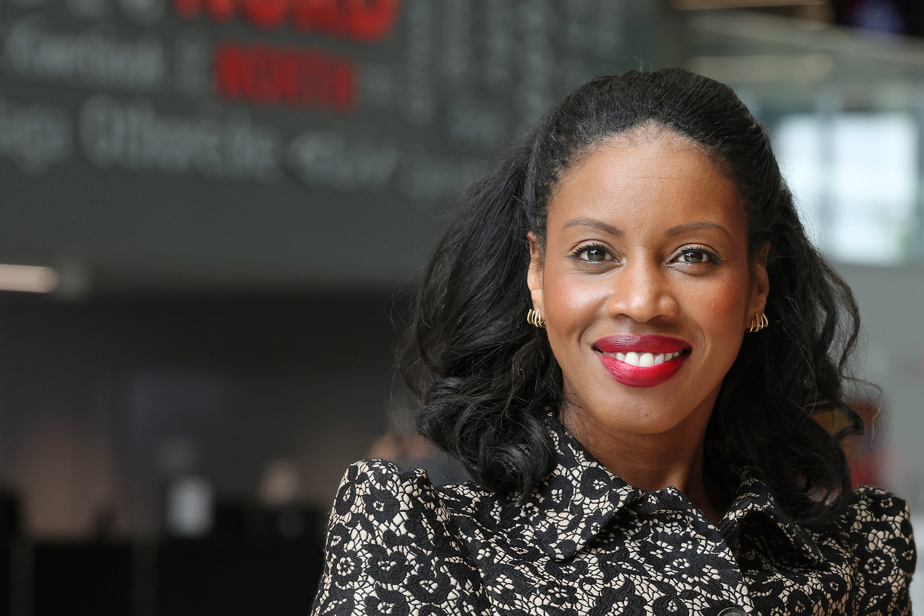Yolande James has not been dormant since she was appointed General Manager for Diversity and Inclusion at Radio Canada in June 2021. There is no indication that she will see a period of lull soon where she will have to make sure that at least one LGBTI person, a visible minority, a person with a disability or of Indigenous people will occupy a key position in all public broadcasting by 2025.
Posted at 8:00 AM
This is what the former deputy and regional minister said on Monday during our conversation. Announced in 2019 by Catherine Tait, President and CEO of CBC/Radio-Canada, this goal is certainly ambitious, especially as it relates to the careers of producer, writer, director, and lead actor.
But like all of the broadcaster’s other diversity and inclusion goals, it does matter, Yolande James insists. “Diversity is not an opinion. It is a fact.”
Yoland James took her time before accepting an interview request. Twelve months, to be exact. During our meeting, our interlocutor justified her silence on the radio by invoking that she “did a lot of work.”
“I wanted to do my homework, build my team and prepare my own action plans.”
achievements
Radio Canada’s creation of a management position, diversity and inclusion, raised many questions this past summer. Today, Yolande James appears to be pleased to put things right and explain her role, which still seems unclear to some viewers.
“As a public broadcaster, we have given ourselves the mandate to reflect the audience, not only in our programming, but among our staff. My role is to make this happen. And to do that, I must work in coordination with all sectors: media, television, communications, finance, etc.”
When asked to list her accomplishments since her arrival, Yolande James opened up by talking about a minority-only acceleration training program. Then mention an initiative that will ensure that we see and hear more new voices on air. “Competent” people with extensive “experience” determine the person who leads a team of seven people.
Yolande James also points out a target of 22% of recruitment, that is, in recruitment, one in five people comes from an under-represented group.
At the same time, she sparked the program “Emerging Leaders”, which will oversee their journey on Radio Canada. “We were told in 2020 that underrepresented groups felt they had no opportunity to advance in the organization.”
The broadcaster itself has also set itself the task of doubling its retention rate for the Indigenous, racialized, and disabled people it employs. “We have to make sure that their integration goes well, Yoland James points out. We must also make sure that all employees share these values, whether they are members of a minority or not.”
To ensure that the vast majority of workers adhere to the comprehensive policies of Radio Canada, Yoland James encourages all who have doubts to come and express their discomfort with them. She says she has no problem having difficult conversations. “You have to have the courage and humility to answer the questions.”
No, Radio Canada’s new measures regarding promotions do not mean that a white person no longer has any chance of being promoted, she swears. These rules simply attempt to correct past injustices.
“Acting is very important. You have to see it to believe it. In front and behind the camera,” she confirms.
face criticism
Yolande James didn’t look at the critics when she created Radio Canada as Managing Director, Diversity and Inclusion. Observers raised eyebrows when such a job emerged, arguing that the former politician would have been paid to speak out about systemic racism.
Today she is proud to defend the existence of the position she inherited.
In this new role, I am at the service of the public. I have to make sure that everyone can be seen, heard, and appreciated. I don’t feel embarrassed about what we do. I am so proud of him. We don’t count the hours. We know where we’re going. I am very satisfied with all of that. I sleep well at night.
Yoland James
Radio Canada has a reputation for being a giant liner that moves slowly, Yoland James will probably have to be patient before noticing the real and lasting changes. But since she has worked in government before, she knows what to expect.
“Don’t come to an organization like Radio-Canada thinking you’re going to change everything at the same time. But I feel like we’re in an appropriate context. We’re moving forward. Someday, it might not be necessary to have someone in charge of inclusion. But until that day I will continue to work for my position to be revoked.”

“Alcohol scholar. Twitter lover. Zombieaholic. Hipster-friendly coffee fanatic.”



